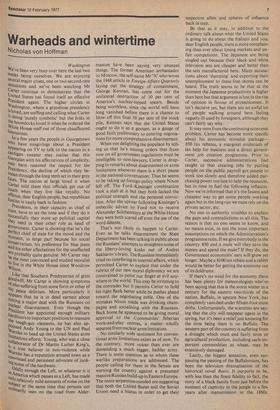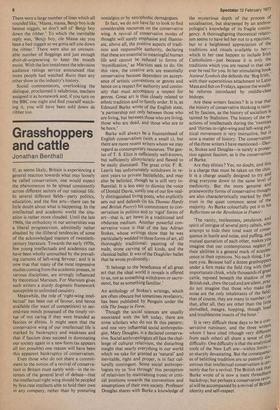Warheads and wintertime
Nicholas von Hoffman
Washington We've been very busy over here the last two weeks being ourselves. We are enjoying several major crises, one or two second-rate sensations and we've been watching Mr Carter continue to demonstrate that the United States has found itself an effective President again. The higher circles in Washington, where a grandiose presidency ■ s loved, are sniffing and calling what Carter Is doing 'purely symbolic' but the folks in the boondocks loved it when he ordered the limousines House staff out of those chauffeured limousines.
In a few years the people in Georgetown who have misgivings about a President aPPearing on TV to talk to the nation in a car, rdigan sweater may realise that this 'corgian with his affectations of simplicity, May have restored the respect for the Presidency, the decline of which they bemoan through the long teeth set in their grey faces. The nation at large loved it when Carter told them that officials get out of touch when they live like royalty. No °fence, dear English people, but republican fustian is vastly back in fashion. Presidents, in their capacity as chief of state, have to set the tone and if they do it successfully they store up political capital theY need in their other role as head of government. Carter is showing that he's the Perfect chief of state for the mood and the "rnent, in large part because his social conservatism, his preference for blue jeans and his other affectations for the unaffected "re probably quite genuine. Mr Carter may !)e the most convinced and studied moralist to live in the White House since Woodrow Wilson.
Like that Southern Presbyterian of grim
!c .°dwill, Mr Carter is showing symptoms also suffering from some form or other of e Peace delirium. More particularly it aPPears that he is in dead earnest about cutung a major deal with the Russians on
uclear disarmament. Even though the ,rresident has appointed enough military
the to important positions to reassure the tough-guy elements, he has also apP.olnted Andy Young to the UN and Paul I\Yarrike to head up the United States arms llnitations efforts. Young, who was a close ollaborator of Dr Martin Luther King's,
a true believer in non-violence while arnke has a reputation around town as a nvInced and persistent advocate of junking some of the hardware.
C/(IdlY enough the Left, or whatever it is _n ikrnerica which passes as a Left, has made sub' relatively relatively mild amounts of noise on the ouh4ect at the same time that persons not rdinarilY seen on the road from Alder
maston have been saying very unusual things. The former American ambassador to Moscow, the self-same Mr 'X' who wrote the 1948 article in Foreign Affairs Quarterly laying out the strategy of containment, George Kennan, has come out for the unilateral destruction of 10 per cent of America's nuclear-tipped spears. Beside being worthless, since the world will have long vanished before there is a chance to blow off this final 10 per cent of the stock pile, Kennan says that the United States ought to do it as a gesture, as a gauge of good faith preliminary to entering negotiations for more comprehensive disarmament When not delighting the populace by telling us that he's issuing orders that from now on all government regulations must be intelligible to non-lawyers, Carter is dropping in remarks about disarmament or arms limitations whenever there is a short pause in the national conversation. Thus he seems to be taking up foreign policy where Nixon left off. The Ford–Kissinger combination took a stab at it but they both lacked the political strength and the personal conviction. After the uproar following Kissinger's imbecilic advice to Ford not to receive Alexander Solzhenitsyn at the White House they were both scared off even the use of the word détente.
That's not likely to happen to Carter. Even as he talks disarmament the State Department has been talking in public about the Russians' attempts to straighten some of the liberty-loving kinks out of Andrei Sakharov's brain. The Russians immediately cried no interfering in internal affairs, which permitted Carter to explain that under the rubrics of our new moral diplomacy we are constrained to point our finger at evil anywhere in the world. This may be irritating to the comrades but it permits Carter to hold his right flank better while he pushes ahead toward the negotiating table. One of the mistakes Nixon made was drinking champagne and socialising with the ,Russians. Back home he appeared to be giving moral approval to the Communists' Siberian work-and-play centres, a matter wholly separate from nuclear arms limitation.
No similarly wide sentiment for conventional arms limitations exists as of now. To the contrary, more voices than ever are demanding a much bigger, badder army. There is some question as to whom these warlike preparations are addressed. The people calling for them in the Senate are warning the country against a presumed massive Russian build-up in Eastern Europe. The more serpentine-minded are suggesting that both the United States and the Soviet Union need a hiatus in order to get their respective allies and spheres of influence back in step.
Be that as it may, in addition to the ordinary talk about what the United States is going to do about the Italians and you, dear English people, there is more complaining than ever about losing markets and unfair competition. The Japanese are being singled out because their black and white television sets are cheaper and better than the sets manufactured here. Many accusations about 'dumping' and exporting their unemployment to these free shores can be heard. The truth seems to be that at the moment the Japanese productivity is higher than here but that argument is lost in the rise of opinion in favour of protectionism. It isn't decisive yet, but there are an awful lot of people walking around here feeling vaguely ill-used by foreigners, although they • can't fairly say why.
It may stem from the continuing economic problem. Carter has become more specific about his economic stimulus package 850 tax rebates, a marginal mishmash of tax help for business and a direct govern ment job creation programme. Prior to Carter, successive administrations had taught us that creating jobs by putting people on the public payroll got people to work too slowly and therefore added purchasing power too late to help the recession, but in time to fuel the following inflation. Now we're informed that it's the fastest and cheapest way to get some people working again but in the long run we must rely on the private sector, etc.
No one in authority troubles to explain the gaps and contradictions in all this. The reason is that no one seems to know, and no means exist, to test the most important assumptions on which the Administration's programme rests. If we give everybody in the country 850 and a mule will they save the money and spend the mule? If they do, the Government economists' ears will grow yet longer. Maybe a 8100 tax rebate and a rabbit would be better for getting the economy out of its doldrums.
If there's no wind for the economy there has been plenty for meteorologists who've been saying that this is the worst winter in a century for the eastern two-thirds of the nation. Buffalo, in upstate New York, has completely vanished under fifteen-foot snow drifts. Unfortunately, the scientists are saying that the city will reappear again in the spring, but it's been a relief just knowing for the time being there is no Buffalo. The western part of the country is suffering from a drought which must end fairly soon or agricultural production, including such important commodities as wheat, may be extensively damaged.
Lastly, the biggest sensation, even surpassing the passing of the Buffalonians, has been the television dramatisation of the historical novel Roots. It purports to be, with less than the finest fidelity to fact, the story of a black family from just before the moment of captivity in the jungle to a few years after manumission in the 1860s.
There were a large number of lines which all sounded like, 'Massa, massa, Benjy boy is de bestest niggah, so don't sell or Benjy boy down the ribber.' To which the inevitable reply was, 'Benjy boy, ole Massa say you been a bad niggah so we gotta sell you down the ribber.' There were also an uncountable number of floggings and just enough droit-de-seigneuring to keep the mouth moist. With the last instalment the television audience ratings service announced that more people had watched Roots than any other show in the industry's history.
Social commentators, overlooking the dialogue, proclaimed it salubrious, teachers assigned it as homework and, if you turn on the BBC one night and find yourself watching it, you will have been sold down de ribber too.



































 Previous page
Previous page